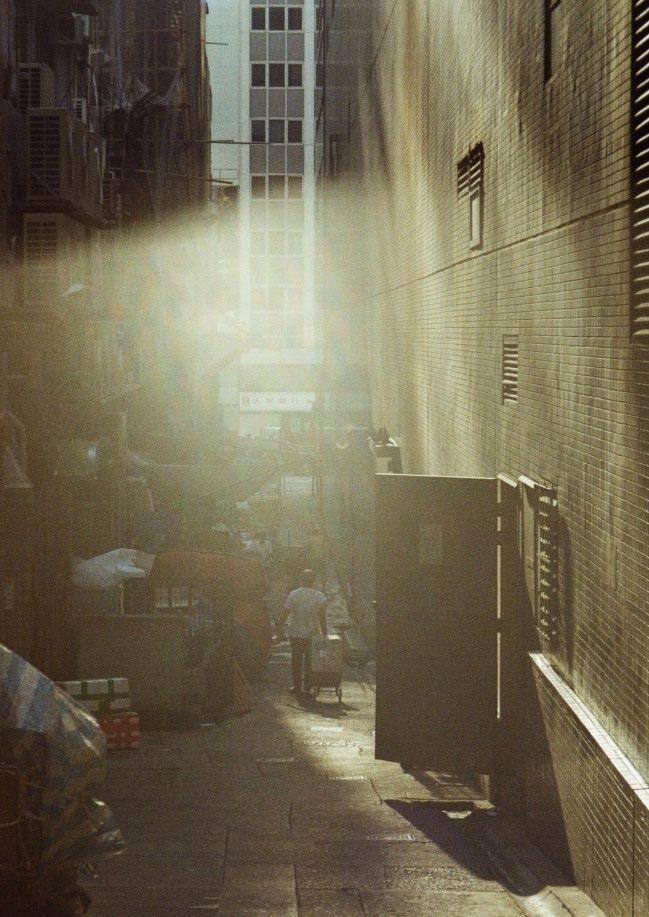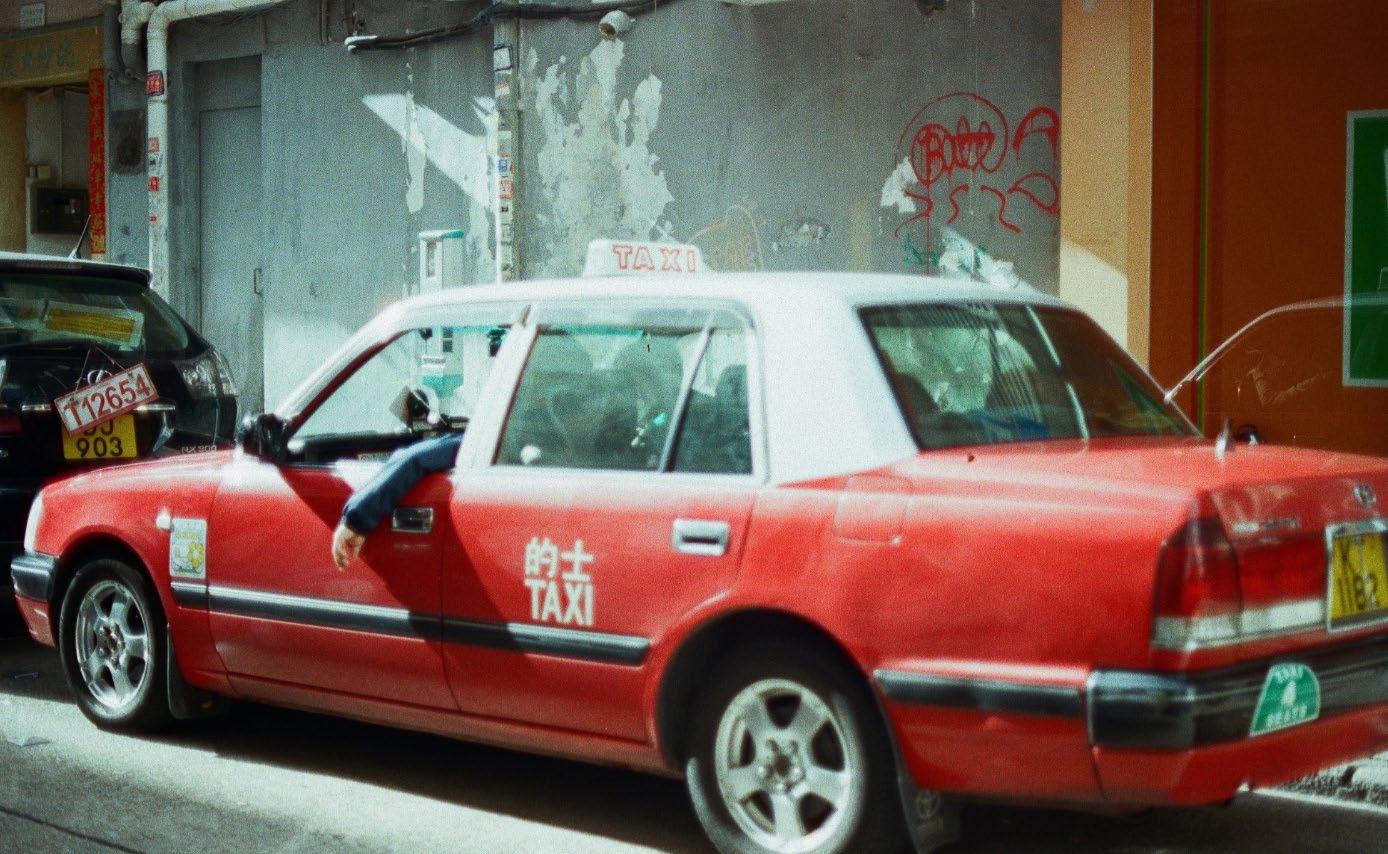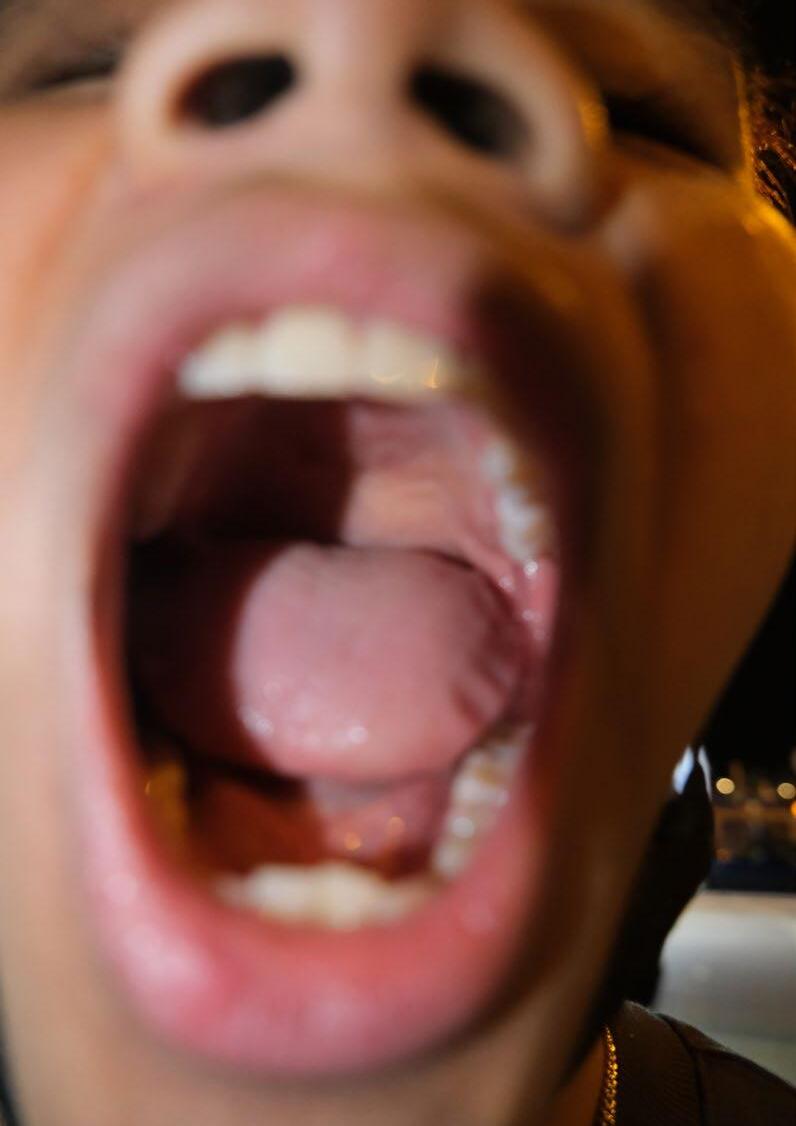
9 minute read
Days Off
by Alyssa Wong
An hour later, having finished dinner early, they were standing on the walkway again. At Sandy’s suggestion, they had come to admire the harbour as it descended into the night.
Advertisement
Darkening slabs of buildings rose out from the shore, pinpricked with brightness. Distant embers of streetlights glowed a soft orange. To their right was the neighbouring Sea Palace floating restaurant, its outline traced in the same shades of neon as Tai Pak. The lights of both restaurants undulated in the water. If Elaine paid attention, she could pick out new shades in each flicker of colour. For example: A deep red in honey, wild and glittering.
The rustle of dining room conversation hovered quietly behind them. Dimly, Elaine wondered what these well-to-do locals and fellow British expats made of her and Sandy together. Perhaps they were classmates, or secretaries at a burgeoning multinational company. When, if, Sandy had brought Elaine’s father here, had they seen something more straightforward? Sordid, even? So many miles untied from her real life, Elaine no longer cared for answers. Instead, she watched Sandy lean over the railings, arms crossed like ribbons.
She wanted more days like this; she wanted Sandy to show her this city street by street, step by step. But that future had the quality of thin paper. There was something else lurking just underneath, shadows shed by a backlight. A pale view of who she was going to become. And what do we see there?
It’ll be July, then August. Sandy will take Elaine to the dancing hall she works at, Tonnochy Ballroom in Wan Chai. Spinning around the world of Sandy Lo, dizzy and devoted. Asking questions and getting answers. Until they know better. Until they let prismatic days shatter and reform into accepted lifestyles. Until hard feelings ossify into a new skeleton, heavy and solid. Good bones. It may be another year, another summer, before these scenes happen. They may play out in another way entirely. Nevertheless, Elaine continued running them through her mind, like unspooling film, like the clicking of a projector reel. Outpacing the future was the only way to avoid it, to avoid that feeling, which was not even one of following a set path, but of standing still with nowhere to go. It was the feeling you were growing up into a stranger’s world.
She had womanhood, women, on her mind. And womanhood was men, it was boys. Boys like Richie Knox, an American banker’s son, sweeter than a toothache and with upper lip perspiration to spare. It was easier to imagine a date with Sandy than Richie. It would, Elaine thought, be something like this day. Here was the most significant problem, the one that crept into every dream –– the expectation that one day the world would be different.
Alyssa Wong is a student, writer, and Barbie collector from Hong Kong. Her love of storytelling began in childhood, when she would use her dolls to enact complex family sagas exploring guilt, betrayal, and the suffering of outcasts. Since then, Alyssa has become less focused on fictional suffering and more focused on non-fictional academic stress. She has also lost all her baby teeth. You can find more of her absurdist statements in the captions of her Barbie fan account, @totallyspecialbarbie.
While Elaine remembered the future, Sandy was remembering the past. She was thinking of the time the children at the Po Leung Kuk orphanage had been taken to Lamma Island as a special treat. She saw herself, thirteen years old, slipping away from the rest. A girl making it to the beach just in time to see raindrops splatter on the sand. It reminds her of Elaine, or, no, it’s Elaine reminding her of this day. Out of the corner of her eye, she sees Elaine examining the sunset. It’s the same expression, Sandy thinks, that she saw from so far away the first time.
Back in April, Lenny had handed her a pile of photos he was discarding. They were out of focus, or taken at the wrong angle, so they couldn’t go in his collection. He thought Sandy might want to keep some. Many featured her, after all. Sandy obligingly flicked through and there it was. The photo he’d taken of her at the same time she’d seen the girl at the end of the road. Her photo self stared back at her, looking somewhere just ahead of the camera, just ahead of the real Sandy. Whatever, whoever, she saw, it was like she couldn’t look away. Not even if she wanted to.
Later in the week, she was trying to mimic that face when Jingjing appeared behind her in the dressing table mirror. A playful smile. She asked, Who’s got you looking like that? Sandy replied, I don’t know yet.
Again, that day at Lamma. She sees veins of lightning strike across the sky. As the rain begins to pour, she starts running towards the beach. She wants to drench herself before the storm can. Tides lap at the shore like the rise and fall of someone’s chest. Ignoring the rocks triangling into the soles of her feet, she ploughs through the water. By this age, she knows she is pretty, a pretty that can be taken and used. Pretty like the magazine features of each year’s Miss Hong Kong, the women whose shadow silhouettes she has traced so hungrily, achingly, even though she knows already that the body is a cage. A cage she is rising out of as air bubbles fizz against her palms, giddy. She waits for thunder, thunder like the grumble of boiling water. Just as she hears it, as sound catches up to light, she plunges into the ocean.
Sandy glances now at Elaine, her face dissolving in darkness. The darkness is tinged with the red flavour of the molten 太 sign illuminated on the roof above them. Usually, she prefers the jade or steamed egg colours, not the New Year’s red. Usually, she would never forfeit a leisurely meal to circumvent strangers’ stares. Because, usually, she’s not this aware of the fluttering weight of watching eyes.
Elaine’s fingertips touch the nape of Sandy’s neck. Sandy’s hand touches the curtain of Elaine’s hair.
The space between light and sound. Lightning cracking the sky open like a shell. Waiting to hear the pieces fall.
with her father. She found herself instead explaining how Sandy had taken her on a tour of the city, carefully dispensing most of the day’s events in a few summative sentences.
“So,” Lenny said, “you’ve met Sandy.” In a tone that was almost neutral, he added, “I figured you’d seen her around.” He paused. “I’m glad you had fun.”
Elaine felt a nudge of surprise that he would react even to this with his standard nonchalance. She was unsure of what to feel or say in response, but she didn’t have to decide; Lenny soon wandered out of the kitchen. Their conversations always ended like this, disappointed by their own communicational shortcomings. The experience was akin to reading song lyrics without ever being allowed to hear the melodies. As she thought this, Elaine walked across the room and picked up her father’s plate, intending to wipe and reshelve it. But it was already dry. Elaine realised with a start that he must’ve been waiting for her.
Outside, it was raining again, a sound like clattering beads. There was a moth plastered against the kitchen window, escaping the wet. Its wings resembled torn newspaper. Its body was fat and fuzzy, like a pellet of lint. It was, Elaine marvelled, a miracle that she was here to see this moth at all.
There had been screams of arguments over whether Aunt Anne had the right to take Elaine to Hong Kong with her. The arguments had finally concluded when Lenny arranged for a job transfer and weekend visits with Elaine. Before that though, there’d been a protracted stalemate primarily consisting of dredging up Joan’s death. Elaine’s mother, according to Aunt Anne, had effectively been killed by Lenny’s ego. He was the one who had persuaded, manipulated, Joan into a second child she didn’t want. It had been a desperate bid to prevent her from leaving him and a narcissistic attempt to prove he was a man, with the job to support a real family. Despite suspecting what Joan would eventually do, he’d left her to die alone in their home.

Lenny told Elaine otherwise. He said he’d been there with her mother, helping her, holding her as she bled out in his arms. Is it so hard for you to believe me? Yes, she’d thought. Aunt Anne was severe, and she was stern, and she held grudges tighter than a fist, but she was no liar. Still, Elaine believed he was sorry. She believed he’d loved his wife, that he wanted to love his daughter, to know her. Forgiveness had felt so certain, like clear water bursting from a rusting tap. She’d struggled to find such forgiveness since. She could not seem to find it at all in Hong Kong. Sometimes, to remember the edges of that forgiving, she tried to imagine how her father must have looked when he first met her mother. Her parents, who came of age in wartime, celebrating their first real New Year’s Eve. Catching eyes as the crowd crashes apart, as fireworks splinter in the sky. The hopeful thrum of wishes and resolutions. Elaine heard her own voice. Can we do this again sometime? She couldn’t help the smile. Beyond the moth on the window, droplets fell neatly from roadside trees, steadily watering puddles on the ground. Soon, the typhoon would be back.
“You’re late.” Lenny notified Elaine of this fact as soon as she entered the kitchen. While he clinked his lone plate into the drying rack, Elaine considered telling him she’d been volunteering with Christian classmates at the Po Leung Kuk orphanage, as Sandy had recommended. It was an excuse tailored for her aunt and uncle. Yet the rules were different nonchalance. She was unsure of what to feel or say in response, but she didn’t have to decide; Lenny soon wandered out of the kitchen. Their conversations always ended like this, disappointed by their own communicational shortcomings. The experience was akin to reading song lyrics without ever being allowed to hear the melodies. As she thought this, Elaine walked across the room and picked up her father’s plate, intending to wipe and reshelve it. But it was already dry. Elaine realised with a start that he must’ve been waiting for her. Outside, it was raining again, a sound like clattering beads. There was a moth plastered against the kitchen window, escaping the wet. Its wings resembled torn newspaper. Its body was fat and fuzzy, like a pellet of lint. It was, Elaine marvelled, a miracle that she was here to see this moth at all. figs of fickle droop low to tree stump’s belly, swaying against its pruned skin, bark dried by wholly sun. oblong tiger tears with stripes fading into taper, convene in clusters of moon grape and granny smith. it is the perfect fruit to cradle flying eggs. below the swinging of ficus bosom, the musk of fruitful rot wavers from half-melted figs sunk into the dirt floor, fig-scent tantalizing wasps until they land on tiger tear skin and begin to burrow.
Be there next week and I’ll tell you.
There had been screams of arguments over whether Aunt Anne had the right to take Elaine to Hong Kong with her. The arguments had finally concluded when Lenny arranged for a job transfer and weekend visits with Elaine. Before that though, there’d been a protracted stalemate primarily consisting of dredging up Joan’s death. Elaine’s mother, according to Aunt Anne, had effectively been killed by Lenny’s ego. He was the one who had persuaded, manipulated, Joan into a second child she didn’t want. It had been a desperate bid to prevent her from leaving him and a narcissistic attempt to prove he was a man, with the job to support a real family. Despite suspecting what Joan would eventually do, he’d left her to die alone in their home.

Lenny told Elaine otherwise. He said he’d been there with her mother, helping her, holding her as she bled out in his arms. Is it so hard for you to believe me? Yes, she’d thought. Aunt Anne was severe, and she was stern, and she held grudges tighter than a fist, but she was no liar. Still, Elaine believed he was sorry. She believed he’d loved his wife, that he wanted to love his daughter, to know her. Forgiveness had felt so certain, like clear water bursting from a rusting tap. She’d struggled to find such forgiveness since. She could not seem to find it at all in Hong Kong. Sometimes, to remember the edges of that forgiving, she tried to imagine how her father must have looked when he first met her mother. Her parents, who came of age in wartime, celebrating their first real New Year’s Eve. Catching eyes as the crowd crashes apart, as fireworks splinter in the sky. The hopeful thrum of wishes and resolutions. Elaine heard her own voice. Can we do this again sometime? She couldn’t help the smile. Beyond the moth on the window, droplets fell neatly from roadside trees, steadily watering puddles on the ground. Soon, the typhoon would be back.
Be there next week and I’ll tell you.
by amber zou
i wonder if the she-wasp too, had melted, digested into the mesh of inverted flower seeds, antennae and wings blown off, so to never fly again. her wither would bud the fig in which she has chosen to nestle in.
she has been thrown into a safe haven of floral blossom begged to be immersed into fig body she has found purpose in surrendering her self to a dense field of pink sugar and seeds.








